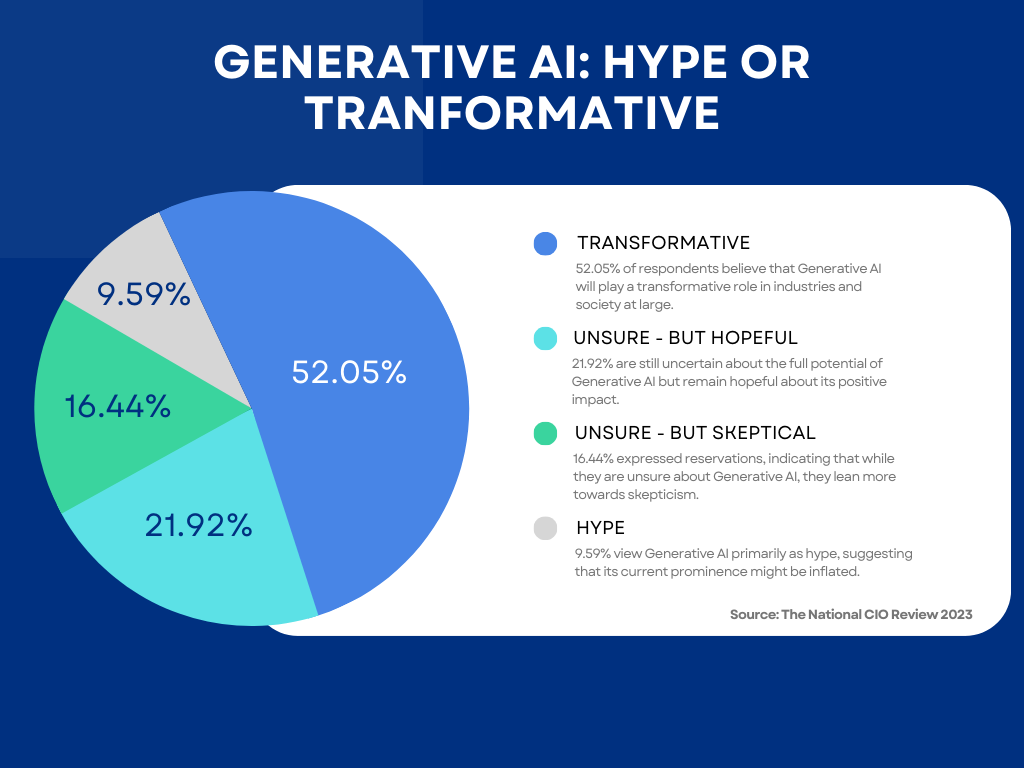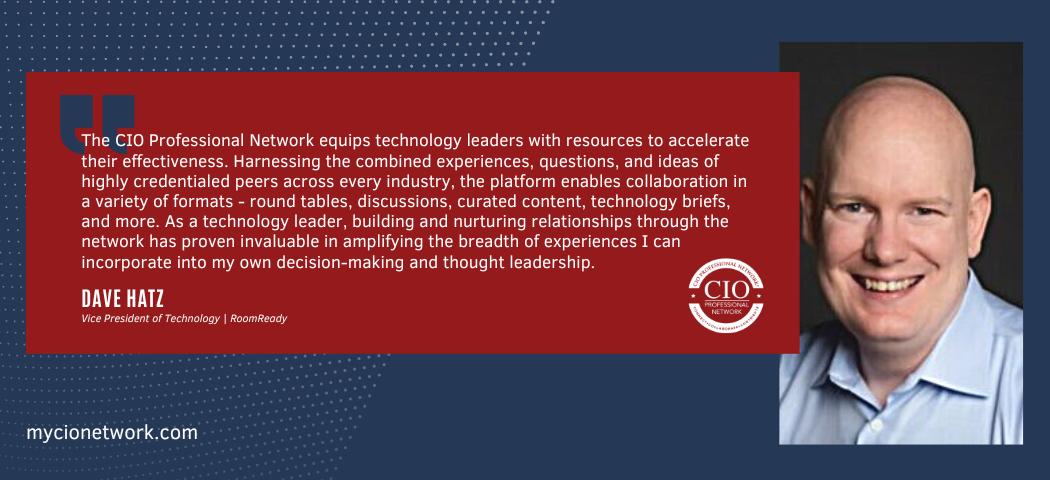Artificial Intelligence (AI) stands at a crossroads, sparking debate on whether it’s a transformative force or just industry hype. Its depiction in media oscillates between visions of utopian futures and cautionary tales, reflecting a broader discourse on its real-world implications. As AI finds its footing in various industries, the question remains: Is it a fleeting trend or a genuine game-changer?
To delve deeper into this debate and navigate the intricacies of AI’s promise and pitfalls, we engaged with our proprietary network of technology thought leaders. Their firsthand experiences and insights provide a grounded perspective. Complementing this, we also sourced opinions from the subscribers of The National CIO Review, ensuring a holistic understanding of the prevailing sentiments and anticipations about AI.
Historical Context
From its conceptual beginnings, AI has undergone several evolutionary phases. The 1950s and 60s saw the birth of symbolic AI, where researchers believed that encoding rules and logic into machines would lead to intelligence. This era was marked by optimism, with pioneers like Marvin Minsky predicting that a machine as intelligent as a human being would exist in a generation.
However, the subsequent decades brought about “AI winters” – periods of stagnation and reduced funding due to unmet expectations. These challenges were primarily technical, as the computational power and data required for complex AI tasks were lacking.
The Current State of AI
The resurgence of AI in the 21st century can be attributed to several factors: the explosion of big data, advancements in machine learning algorithms, and significant increases in computational power. Neural networks, once relegated to the academic fringes, became the cornerstone of modern AI, leading to breakthroughs in fields like computer vision, natural language processing, and robotics.
Current capabilities touch upon sectors as diverse as healthcare, finance, entertainment, and manufacturing. Machine learning models can predict stock market trends. AI-driven robots can assist in surgeries. Natural language processing tools can facilitate real-time multilingual communication.
Lonnie Snyder, Chief Technology and Information Officer for the 2026 Special Olympics USA Games, sees AI as a game-changer. He believes that “Generative AI is here to stay,” emphasizing its transformative potential and the responsibility of tech leaders in its safe and effective adoption.
Jerry Heinz, Chief Information Officer for Genvid Holdings, echoes this sentiment. “While I do see a lot of hype and unrealistic expectations, I see AI as more transformative technology than buzzword,” Heinz shares. Particularly with the advent of generative AI, he views the current phase as akin to a new industrial revolution that will fundamentally impact how we work and live.

Generative AI: The Verdict
One domain that has captured significant attention is Generative AI. This technology, with its ability to autonomously create content ranging from text and images to music, represents a paradigm shift in how we perceive content creation.
To delve deeper into these questions and gauge the sentiment of technology leaders on this specific AI domain, The National CIO Review conducted a comprehensive poll of its technology leadership community. The aim was to capture a holistic view and perspective on the hype or transformative debate of Generative AI. The results were revealing:
- Transformative: 52.05% of respondents believe that Generative AI will play a transformative role in industries and society at large.
- Unsure – But Hopeful: 21.92% are still uncertain about the potential of Generative AI but remain hopeful about its positive impact.
- Unsure – But Skeptical: 16.44% expressed reservations, indicating that while they are unsure about Generative AI, they lean more towards skepticism.
- Hype: 9.59% view Generative AI primarily as hype, suggesting that its current prominence might be inflated.
These results underscore the prevailing optimism around Generative AI, with a significant majority viewing it as transformative. However, the presence of skepticism and uncertainty indicates the need for further exploration, research, and real-world applications to validate these sentiments.
Economic, Industry Impacts, and Ethical Considerations
The integration of AI brings both profound economic ramifications and significant challenges. On the economic front, businesses stand to gain from increased efficiencies, reduced operational costs, and the opening of new revenue streams. However, there’s also the looming threat of job displacements in sectors where automation might replace human roles.
Walt Carter, Chief Information Officer for Homestar Financial Corporation, provides a pragmatic perspective on AI’s impact on businesses. He suggests, “As technology leaders, we need to approach this with a CFO mindset and not just introduce new exciting measures. Keep it simple — are we moving the needle in a positive way toward value capture for our org? We have business problems and business opportunities; how do these tools help us solve the problems or seize the opportunities at a reasonable cost to value gained?”.
Heinz offers that “As a technologist in the entertainment sector, software like Midjourney and OpenAI excite me because it allows a studio to amplify the work of its writers and artists. However, that same efficiency causes fear among those creatives that their work will be completely co-opted by machines,” Heinz observes.
There is also growing concern about AI regarding issues of privacy, data security, and the potential misuse for malicious purposes. Snyder, discussing platforms used for the Special Olympics, emphasizes the importance of content moderation and the need to ensure athletes can “share their experiences” while maintaining stringent privacy safeguards.
The Role of Technology Leaders
Without a doubt the onus falls upon technology leaders to steer this ship. Their decisions, both in terms of AI adoption and its ethical considerations, will shape the trajectory of industries and ongoing societal perceptions of AI.
“Generative AI is here to stay, and as tech leaders, we need to help our business partners find the best ways to leverage this while keeping the enterprise safe.”
Lonnie Snyder, CTIO – 2026 Special Olympics USA Games
Heinz emphasizes the nuanced role of technology leaders in this transformative era. He underscores the importance of perspective: “This is a revolution of efficiency. Where AI becomes all hype is when we consider it as a replacement for, rather than augmentation of, human ingenuity and creativity.” Heinz’s insights highlight the responsibility of tech leaders to ensure that AI is used as a tool to enhance human potential, rather than overshadow or replace it.
“This is a revolution of efficiency. Where AI becomes all hype is when we consider it as a replacement for, rather than augmentation of, human ingenuity and creativity.”
Jerry Heinz, CIO – Genvid Holdings
As AI becomes an integral part of societal infrastructure, there’s a pressing need for comprehensive preparation. This encompasses fostering AI literacy among the masses, ensuring that individuals understand the capabilities and limitations of AI. Regulatory frameworks also need to evolve, striking a balance between promoting innovation and safeguarding against potential misuse.
“As technology leaders, we need to approach this with a CFO mindset and not just introduce new exciting measures.”
Walt Carter, CIO – Homestar Financial Corporation
Carter’s advice for CIOs is both timely and insightful. He suggests a problem-first approach, stating, “Lots of pressure on the CIOs from the c-suite because of the PR barrage – ‘What are we doing?!?’ I believe the right answer to that is, ‘What are willing to spend to ‘do something’?’ ‘Our competition has these tools working for them already, where are we?’ The best answer here is to focus on the opportunity/challenge and get to the heart of it before bringing in the toolset but be ready to run to the fire.”
The Wrap
As we stand on the precipice of an AI-driven era, the landscape of technology, business, and society is undergoing a seismic shift. AI, in its current state, represents a confluence of promise, challenges, and transformative potential.
As businesses, policymakers, and individuals grapple with this next technology revolution, the collective choices made will resonate for years to come. It’s imperative that technology leaders approach this transformative technology with both optimism and caution, ensuring that its benefits are harnessed while addressing its challenges head-on.











